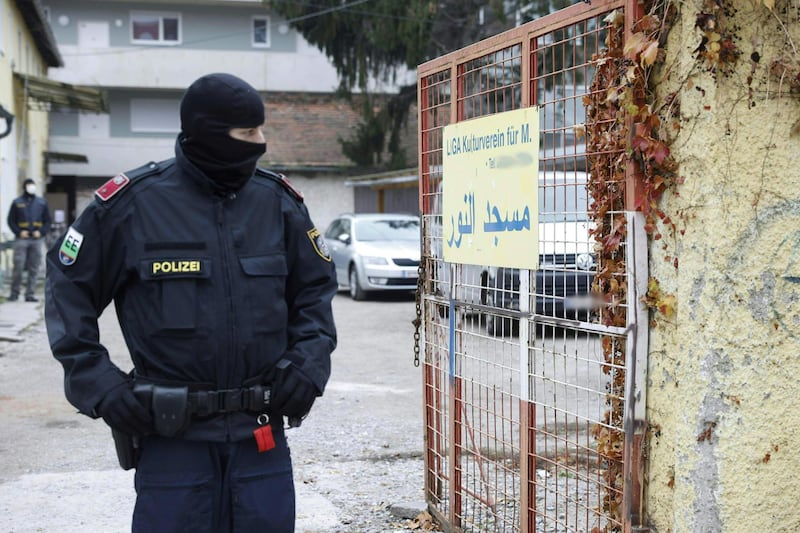Dawn raids targeting groups suspected of operating on behalf of the Muslim Brotherhood and Hamas were carried out by Austrian police on Monday in a major crackdown.
Officers made 30 arrests in more than 60 raids under anti-terrorism laws, the Austrian government said.
The targets of the raids on flats, houses, businesses and other premises were people suspected of belonging to or supporting the Islamist movements Hamas and the Muslim Brotherhood.
"The suspicion is of belonging to a terrorist organisation, financing terrorism, association against the state, criminal organisation and money laundering," the prosecutor’s office in the southern city of Graz said.
The operation was launched in four of Austria's nine provinces: Styria, of which Graz is the capital, Carinthia, Vienna and Lower Austria. More than 900 police were involved in the sweeps and a trove of documents, mobile telephones and computers seized for further analysis. Franz Ruf, director-general of public security in Graz, said officials had 21,000 hours of surveillance on the suspects and premises.
The police raids took place less than a week after a major terrorist incident in Vienna that was claimed by ISIS but the two investigations are not linked.
Austria's Interior Minister Karl Nehammer and the country's lead counter-extremism minister Susanne Raab stressed there was a focus on the ideological threats posed by the organisations in the country.
Hamas, which won the last Palestinian parliamentary election in 2006, was founded as the Palestinian branch of the Muslim Brotherhood and is designated a terrorist organisation by the United States and European Union.
The Muslim Brotherhood is not on the bloc's terrorism blacklist but prosecutors said they were investigating links between the two organisations. In Austria courts have accepted arguments that Muslim Brotherhood activities constitute a terrorist threat and are grounds for criminal prosecution.
Graz prosecutors said the case involved investigations into activities of 70 people based across more than 60 properties, including apartments and offices. They said the raids resulted from more than a year of investigations.
According to a report commissioned by the Austrian authorities and written by the George Washington University scholar Lorenzo Vidino, the country is one of the strongholds of the movement in Europe. Among the keystone groups in Austria is the Moslemischer Sozialdienst (MSD), an organisation that was founded in the early 1960s by Ghaleb Himmat. Another is the Liga Kultur Verein, which has links to the Federation of Islamic Organisations in Europe (FIOE), the pan-European umbrella organisation for Muslim Brotherhood affiliates.
Also in Austria the organisation's main magazine outside the Middle East, al- Da'wa fi-Uruba (Predication in Europe), came out of Vienna in the 1970s and 1980s.
"Historically, the Egyptians and Syrians have been the most active Brotherhood branches in Austria; however, the country has seen the presence of activists from other national branches of the movement," the 2017 report said. "For example, several individuals linked more or less directly to Hamas, the official Palestinian branch of the Muslim Brotherhood, have long called Austria their home."
Youssef Nada, the self-described "foreign policy envoy" of the Muslim Brotherhood, was active in building the movement in Austria in the early 1970s. When Mr Nada’s personal phone book was seized by Swiss authorities it had an entry for "Abdelaziz Khalifa, Vienna”, an important figure in the movement. The report also looked at specific leaders in Graz, where the bulk of the raids were carried out on Monday.
"Arguably, the most prominent Egyptian Brother to reside in Graz in recent years is Ayman Ali," it said. "Ali’s career in the Muslim Brotherhood, as well as his activities in Austria and around the world, have been detailed in an extensive legal case which made its way all the way to the federal appeals court.
"It is relatively unproblematic and straightforward to identify individuals like Yussuf Nada or Ayman Ali as 'Muslim Brotherhood' - it is significantly more complicated to apply the same label to some of the organisations directly or indirectly created by these pioneers."
Mr Nedhammer revealed that millions of euros had been frozen or seized in the investigation, code-named Operation Luxor. He said the target was "religiously motivated, political extremism" that sought to "carry out a long-planned Islamisation".
"Our goal is to protect all people who live in Austria, especially Muslims, from these tendencies," he said.







